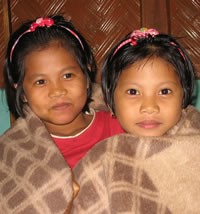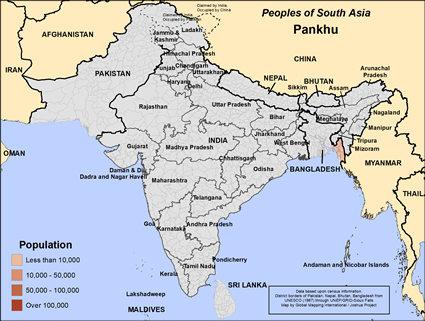Pankhu, Panko in Bangladesh

Photo Source:
Anonymous
|

Map Source:
People Group data: Omid. Map geography: UNESCO / GMI. Map Design: Joshua Project
|
| People Name: | Pankhu, Panko |
| Country: | Bangladesh |
| 10/40 Window: | Yes |
| Population: | 5,900 |
| World Population: | 5,900 |
| Primary Language: | Pangkhua |
| Primary Religion: | Buddhism |
| Christian Adherents: | 3.31 % |
| Evangelicals: | 0.00 % |
| Scripture: | Translation Started |
| Ministry Resources: | No |
| Jesus Film: | No |
| Audio Recordings: | Yes |
| People Cluster: | South Asia Buddhist |
| Affinity Bloc: | South Asian Peoples |
| Progress Level: |
|
Introduction / History
The Panko Pankhu are one of the people groups of the Chittagong Hill Tracts of southeast Bangladesh. Most Panko Pankhu villages are deep in the jungles of Rangamati district, and many must be reached by boat for most of the year.
What Are Their Lives Like?
The Panko Pankhu build their houses on top of hills. Their houses are made of bamboo, wood and tin. Their main profession is jhum (slash-and-burn shifting cultivation) farming, but now a few of them are working in local NGOs. The younger generation are becoming more educated than their parents.
Among themselves the Panko Pankhu speak their own Pangkhua language. They don't have any written materials in their language. With people from other communities they speak local Chittagonian (known as Pahari Chatgaya Vasha). Many of them can also speak Bawm as a second language. Some of them speak the national language Bangla and neighboring languages such as Tangchangya, Chakma, and Tripura.
What Are Their Beliefs?
Some of the Panko Pankhu people are now Christian. Since they don't have any written materials in their language, they are using Mizo (Lushai) Christian literature.
What Are Their Needs?
Among themselves the Pangkhua speak their own Pangkhua language. They don't have any written materials in their language, including gospel materials.
Prayer Points
Pray for the Panko Pankhu people to experience and embrace the glory of Jesus Christ.
Pray for Panko Pankhu disciples to make more disciples.
Pray for a spiritual hunger that will motivate them to change.